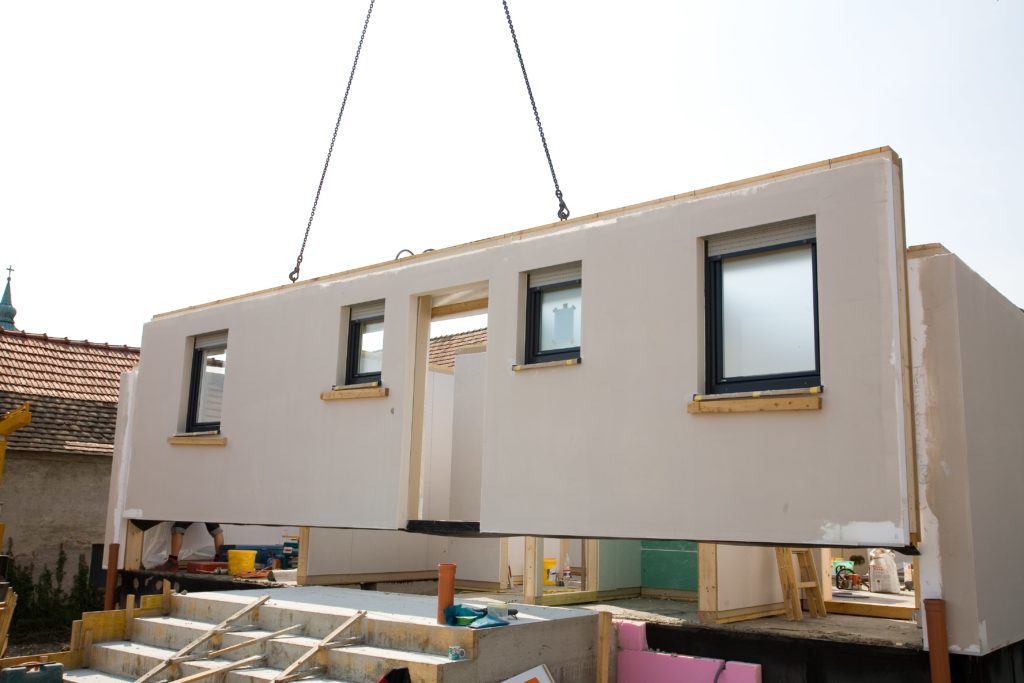Sectors - Commercial
UKIS Engage: Can MMC Answer Housing Needs

With the UK Government looking for a way to deliver a target of 300,000 new homes a year by the mid 2020s, modern methods of construction (MMC) is something that is often spoken about as being a quick and easy solution, but is it something that is viable?
In short, yes. MMC is something that can be used, but the UK isn’t quite there yet. MMC is still a very new concept to many, so, to overcome any confusion around new and innovative techniques, as well as increasing understanding of what MMC involves, the UK Government has asked the Ministry for Housing, Communities and Local Government (MHCLG) Joint Industry Working Group on modern construction methods to develop a definitional framework in which modern construction techniques can be categorised.
This framework is designed to help insurers, mortgage lenders and other industry stakeholders to engage with MMC developments and provide them with relevant financial products.
Those who are advocates of using MMC cite several benefits when it comes to using these methods in comparison to traditional building and construction techniques, with the most common being:
- Quicker and more predictable delivery
By using MMC, there could be a possible 20-60% reduction in construction time, mostly due to the benefits of working indoors and avoiding weather disruptions.
- Better quality of delivery
Almost zero defects on completion and reduced incidence of defects occurring in use.
- Reduction in costs
There could be a possible 20-40% reduction in costs of construction and there is also the potential for improved whole life costs.
- More efficient use of materials
Around half of waste produced in the UK comes from the construction industry. By using MMC, factories can be optimised to minimise material waste to below 1% of the total. This is in comparison to traditional construction, which typically varies between 18% and 22%
- Fewer people on site
Thanks to MMC, fewer people are needed on site. This could mean a potential reduction of 70%+ when looking at on site labour. This would also alleviate fears for businesses when it comes to post-Brexit labour shortages.
- Improved health and safety of staff
If a larger proportion of the workforce is factory based, then working can be controlled in a safer manner, especially when working at height or, in the case of the Coronavirus, enacting social distancing measures.
- More diverse workforce
Currently, women make up just 12% of the construction industry workforce. By increasing the proportion of factory-based work along with the introduction of more standardised working hours, a more diverse workforce could be created.
- Reduction in energy consumption
MMC homes can typically use 20-30% less energy to heat in comparison to traditionally built new housing.
- Lighter weight of construction and shallower foundations
Modular housing and buildings are around 30% lighter than conventional masonry construction, and due to this, can withstand shallower foundations.
MMC offers a variety of positives, so what is stopping MMC being the new normal in the construction industry? At present, the MMC lacks qualified evidence to compare it to traditional building methods. But a recent report by the CIRIA and the Lang O’Rourke Centre for Construction Engineering and Technology at the University of Cambridge, launched in March 2020, concluded: “The insufficient availability and consistency of data on projects..highlighted the challenges in benchmarking projects over their full life cycle. This applies to projects across the spectrum, from traditionally constructed projects to those with high levels of offsite construction.”
Often in the early industrial innovation cycle, there can be a high level of experimentation with many different manufacturers and contractors involved as well as a wide variety of models being experimented with. This often means that homebuilders can be prevented from taking advantage of economies of scale to drive down costs, or the speed advantages of being able to recycle designs, which inevitably can lead to increased costs and caution.
When looking at location, some types of modular housing are appropriate for certain sites, and not for others. For example, if there are limitations to on-site access, it might not be possible to install externally produced modular homes. It is not desirable to concentrate too narrowly on certain types of modular housing, but instead to develop a small number of solutions and techniques that offer flexibility depending on the site’s typology to enable the industry to take advantage of economies of scale.
Even with the above reasons, many housebuilders have taken a leap of faith. Barratt Homes is now building 10% of their new homes in factories with a target to increase this to 20% by the end of 2020. Countryside Homes, Crest Nicholson and Persimmon also all have off-site housing factories.
If modern methods of construction has the ability to prove its worth in comparison to traditional construction, and if it can also speed up the experimentation and innovations stages to produce smaller numbers of standardised MMC solutions, with the help of the NHCB Accepts warranty, it would seem inevitable that mass adoption is like to be on the horizon of the construction industry.
The UK Infrastructure Show (UKIS) is the UK’s leading infrastructure and supply chain event, which explores the latest developments across the sector. This year, UKIS is going online and will be delivered as a live, online interactive event on Wednesday 9 September 2020.
More information on what you can expect from this new digital event experience can be found by visiting the UKIS website here.
This piece originally was published by Glenigan
If you would like to read more like this, then please click here
Related Articles
Related Articles
- Cinema Boosts Leisure Work for JPG
16 Dec 21
JPG Group has announced that it is set to provide consultancy services for the delivery
- Winvic Completes DSV 3 Building Facility
9 Dec 21
Winvic Construction Ltd has completed a 522,000 square ft industrial facility and offices for global
- Low-Carbon Office Redevelopment Secured
25 Nov 21
ISG has been awarded a major project to redevelop One Millennium Bridge, by Beltane Asset





